Unit8 It must belong to CarlaSectionA 1a-2d课件
文档属性
| 名称 | Unit8 It must belong to CarlaSectionA 1a-2d课件 |
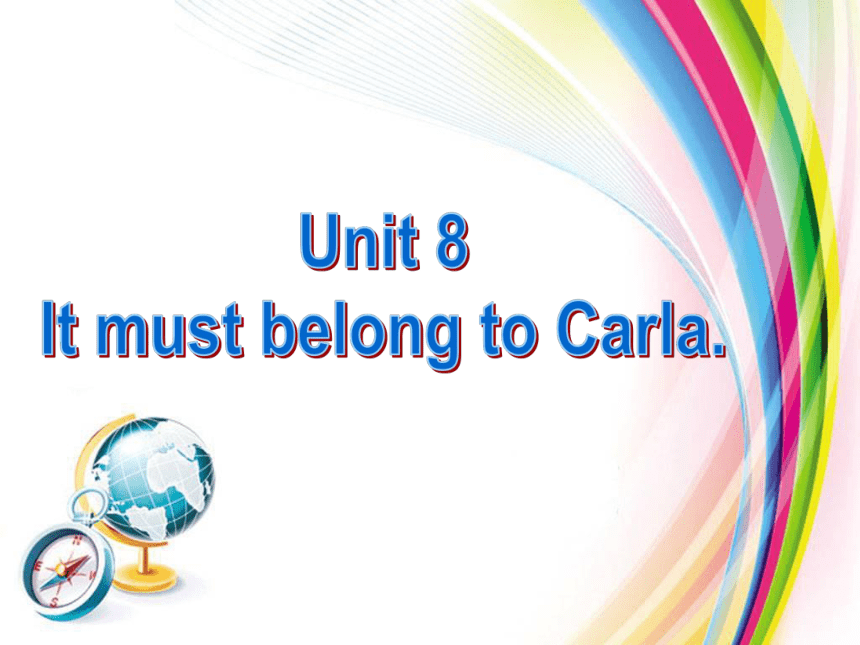
|
|
| 格式 | pptx | ||
| 文件大小 | 4.0MB | ||
| 资源类型 | 教案 | ||
| 版本资源 | 人教新目标(Go for it)版 | ||
| 科目 | 英语 | ||
| 更新时间 | 2018-07-08 00:00:00 | ||
图片预览

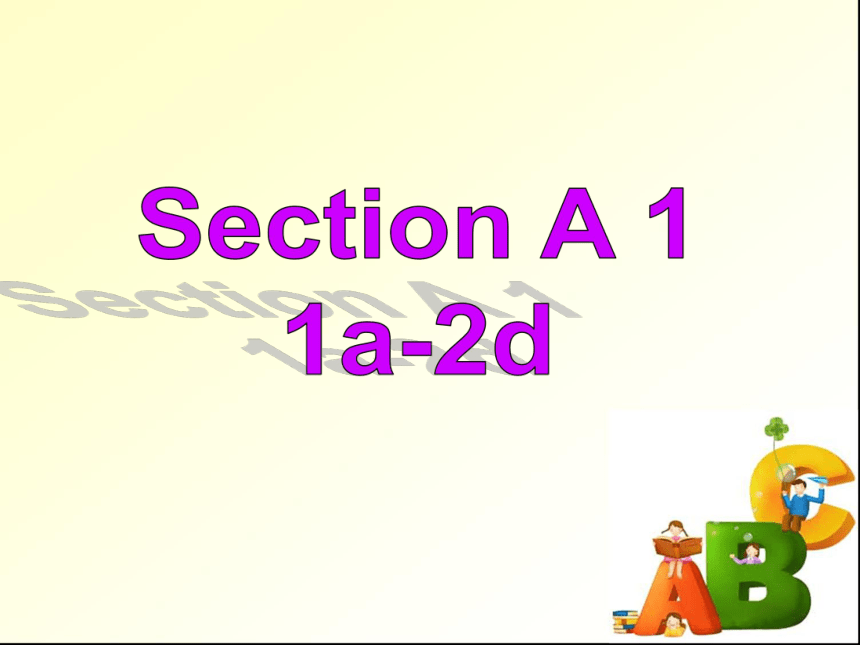
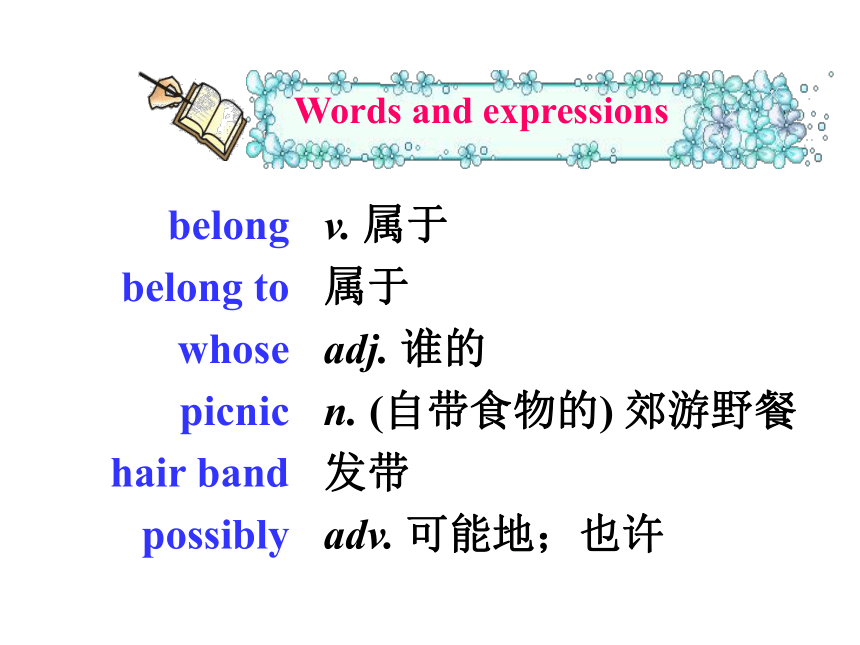
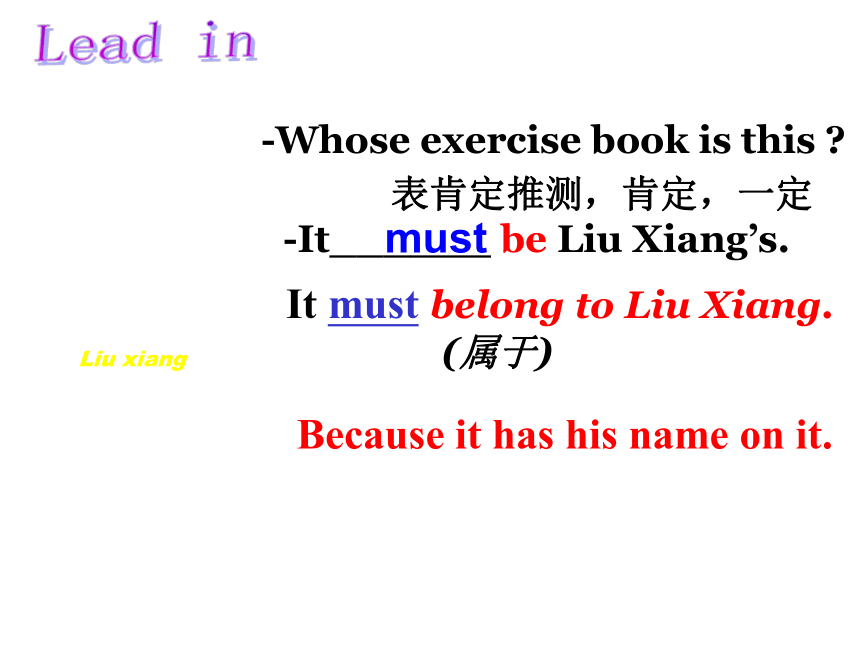
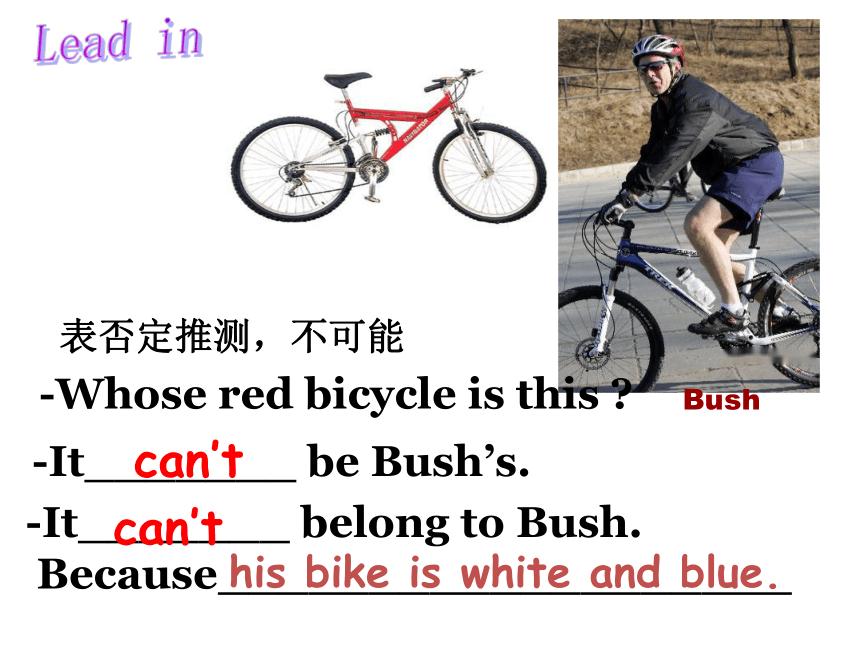
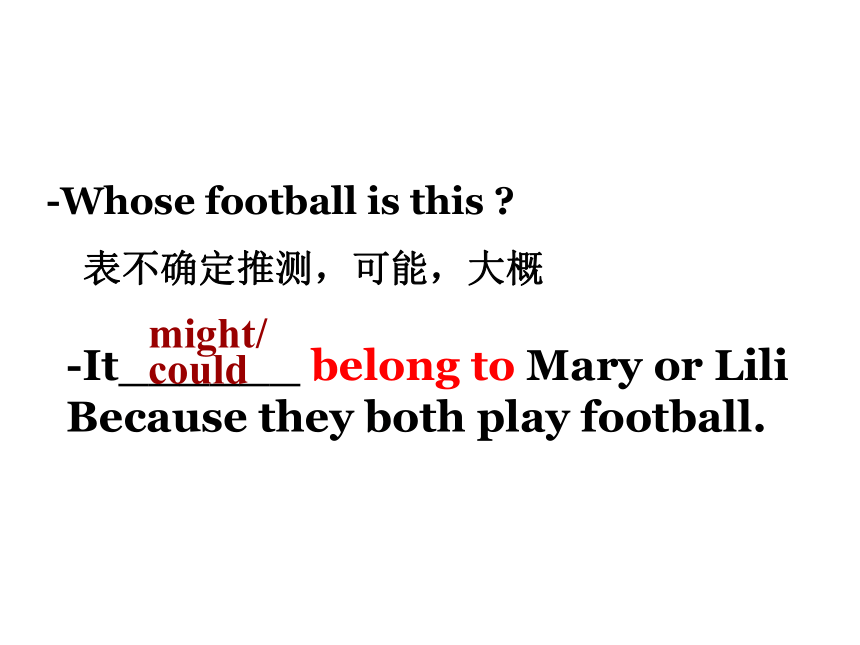
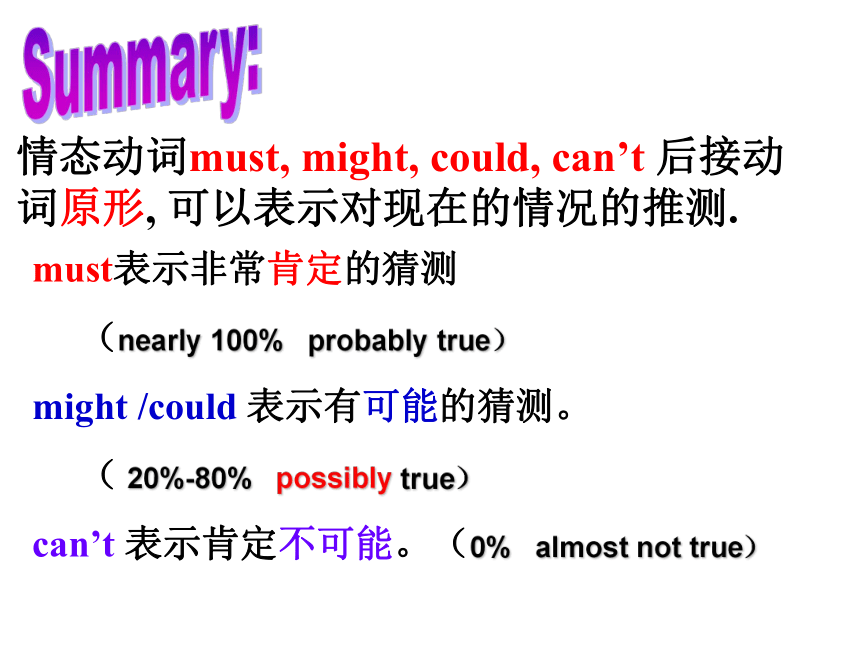
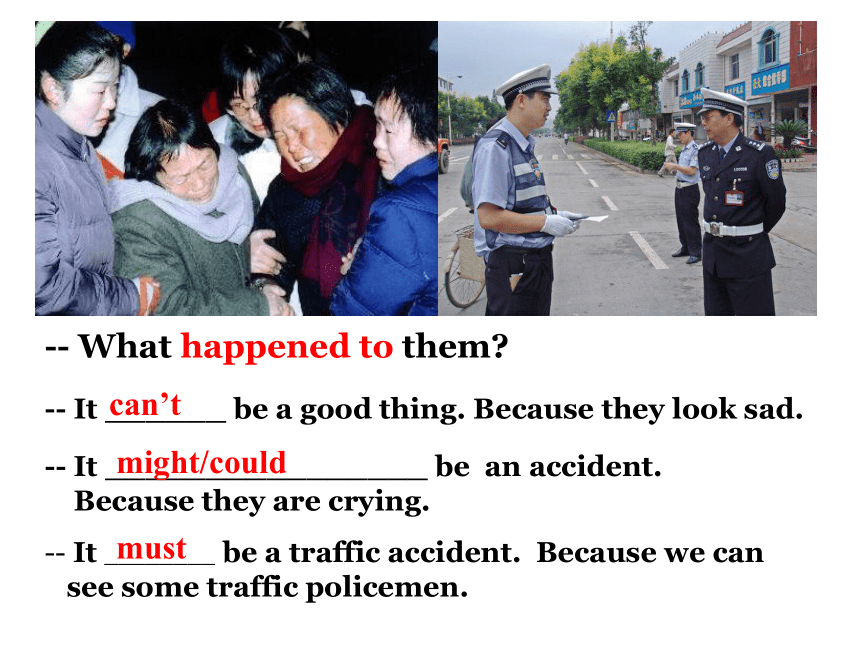
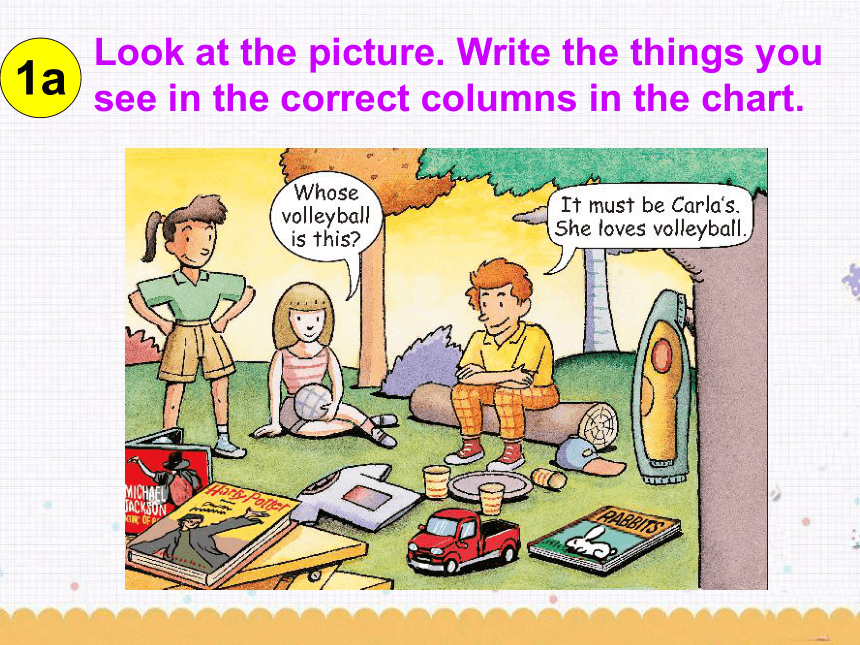
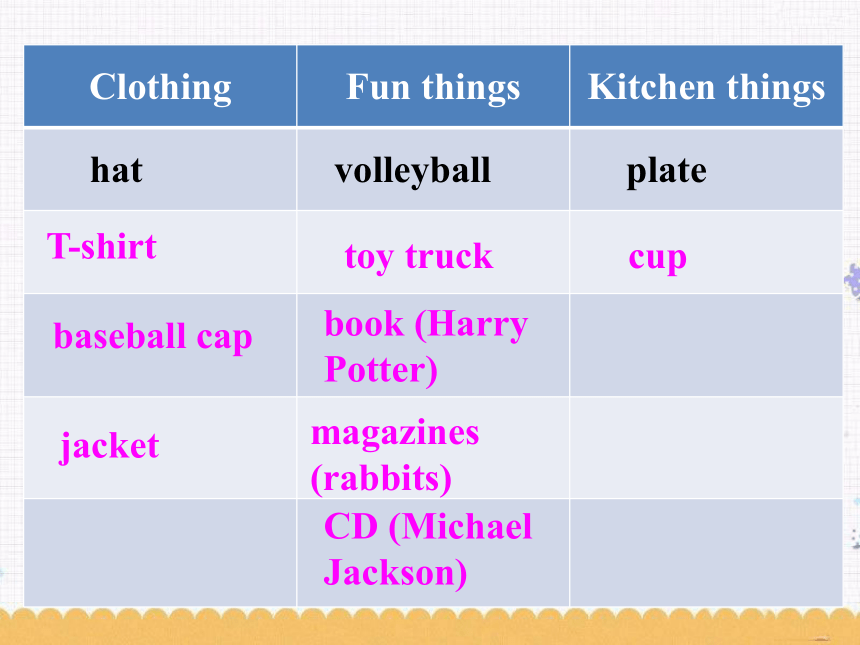
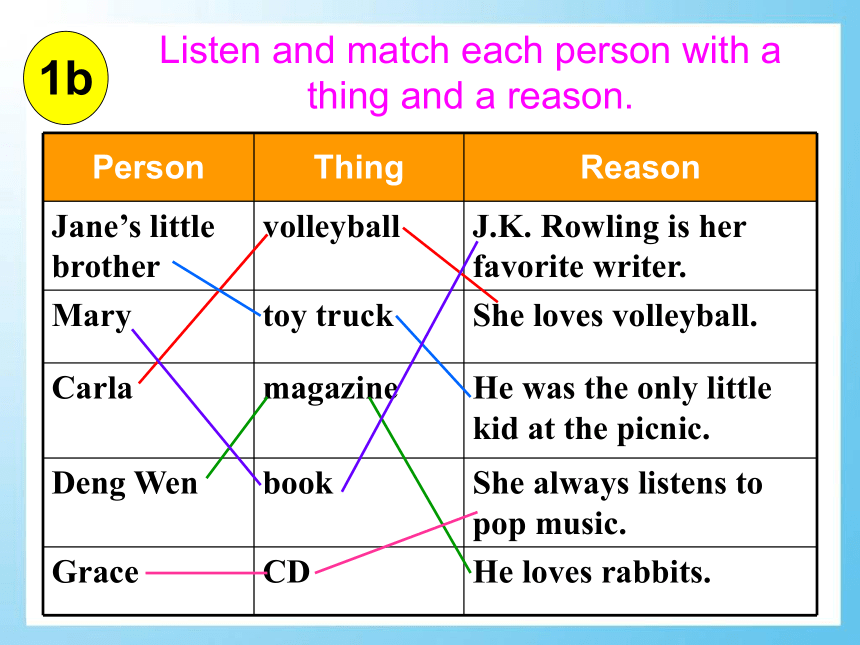
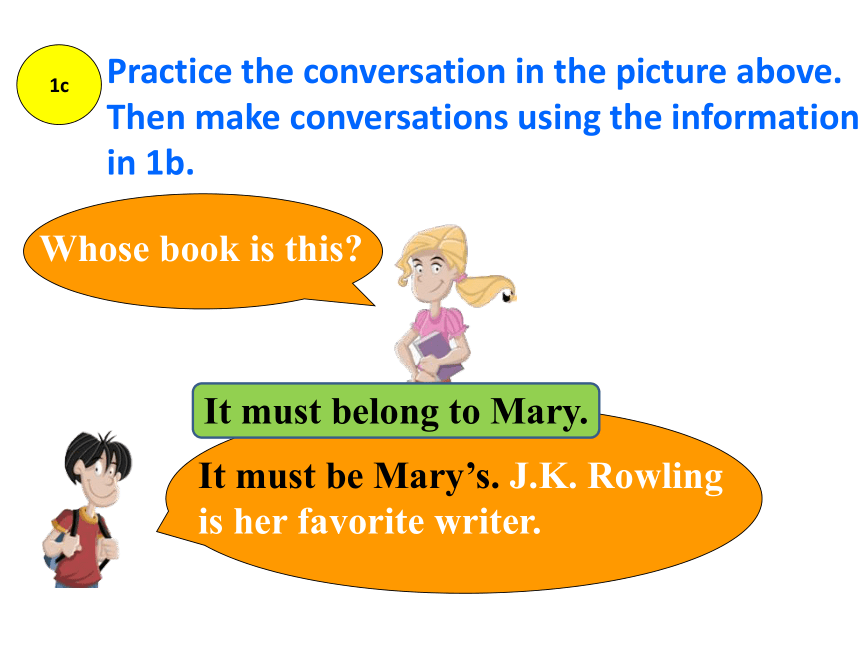
文档简介
(共78张PPT)
Unit 8
It must belong to Carla.
Section A 1
1a-2d
belong
belong to
whose
picnic
hair band
possibly
v. 属于
属于
adj. 谁的
n. (自带食物的) 郊游野餐
发带
adv. 可能地;也许
Words and expressions
Liu xiang
-It______ be Liu Xiang’s.
-Whose exercise book is this
It must belong to Liu Xiang.
(属于)
Because it has his name on it.
must
Lead in
表肯定推测,肯定,一定
-It_______ belong to Bush.
Because___________________
Bush
-Whose red bicycle is this
can’t
his bike is white and blue.
-It_______ be Bush’s.
can’t
Lead in
表否定推测,不可能
-It______ belong to Mary or Lili
Because they both play football.
-Whose football is this
might/
could
表不确定推测,可能,大概
情态动词must, might, could, can’t 后接动
词原形, 可以表示对现在的情况的推测.
Summary:
must表示非常肯定的猜测
(nearly 100% probably true)
might /could 表示有可能的猜测。
( 20%-80% possibly true)
can’t 表示肯定不可能。(0% almost not true)
-- What happened to them
-- It ______ be a good thing. Because they look sad.
-- It ________________ be an accident.
Because they are crying.
-- It ________ be a traffic accident. Because we can
see some traffic policemen.
might/could
can’t
must
1a
Look at the picture. Write the things you see in the correct columns in the chart.
Clothing Fun things Kitchen things
hat volleyball plate
T-shirt
jacket
baseball cap
toy truck
book (Harry Potter)
magazines (rabbits)
CD (Michael Jackson)
cup
Listen and match each person with a thing and a reason.
1b
Person Thing Reason
Jane’s little brother volleyball J.K. Rowling is her favorite writer.
Mary toy truck She loves volleyball.
Carla magazine He was the only little kid at the picnic.
Deng Wen book She always listens to pop music.
Grace CD He loves rabbits.
Practice the conversation in the picture above. Then make conversations using the information in 1b.
1c
It must be Mary’s. J.K. Rowling
is her favorite writer.
Whose book is this
It must belong to Mary.
Whose volleyball is this
It must be Carla’s. She loves volleyball.
It must belong to Carla.
Whose toy truck is this
It must be Jane’s little brother’s. He was the only little kid at the picnic.
It must belong to Jane’s little brother.
Whose magazine is this
It must be Deng Wen’s. He loves rabbits.
Whose CD is this
It must be Grace’s. She always listens to pop music.
情态动词 must, might, could, can’t 后接动词原形, 可以表示对现在的情况的 。
It can’t ( )…
It might/could ( ) …
It must ( ) …
+ be (cold/a CD/ sb’s)
Summary:
★
★
be Tony’s.(是…的)
It must
推测
不可能
有可能
肯定
belong to Tony. (属于…)
It must belong to Carla.
belong to 意为“属于”,它一般不用于
进行时态和被动语态。如:
The hair band belongs to Anna. (√)
The hair band is belonging to Anna. (×)
The hair band is belonged to Anna. (×)
此外,belong to sb. 通常可以和名词性物主代词或名词所有格(一般是’s 所有格)互相转换。
如:
The blue jacket belongs to him / Jerry. →
The blue jacket is his / Jerry’s.
It must be Mary’s. J. K. Rowling
is her favorite author.
此处must表示推断,通常与be连用,意为“一定是,肯定是”。 must这种表示推测的用法只用于肯定句中。
拓展
must 表示“必须”,用于肯定句、否定句或疑问句中;用于否定句中,mustn’t 的意思是“一定不要、禁止”。
我们必须找到一个学习英语的好方法。
We must find a good way to learn English well.
你们一定不能在广场上踢足球。
You mustn’t play soccer in the square.
我必须打扫教室吗?
—Must I clean the classroom
—Yes, you must .(No, you needn’t . / No, you don’t have to.)
Whose volleyball is this 这是谁的排球?
Whose notebook is this = Whose is this notebook 这是谁的笔记本?
探究总结:
Whose既可以用作形容词,又可以用作名词,意为“谁的”,是who的所有格形式。询问物品的主人时, 常用“whose + 名词 + 一般疑问句”或“whose + 一般疑问句”的结构。 其回答常用名词所有格、名词性物主代词或动词短语belong to .
Whose volleyball is this
= Whose is this volleyball
Whose book is this
= Whose is this book
Whose toy cars are those
= Whose are those toy cars
Whose CDs are these
=Whose are these CDs
1. This book ________ be Carla’s. Her
name is on the book.
A. might B. could
C. must D. can’t
2. Jack’s bike is blue, so this yellow one
____ be his.
A. mustn’t B. can’t
C. couldn’t D. mightn’t
Choose the best answer.
3. The guitar ________ belong to Alice.
Only she plays the guitar here.
A. could B. must
C. can’t D. can
4. - What do you think “upset” mean
- I’m not sure. It ________ mean sad.
A.must B.can
C.might D.can’t
5. This backpack must be ________. I
saw her carry it yesterday.
A.Lucys B.Lucy
C.Lucys’ D.Lucy’s
情态动词 用法 例句
must 表示很有把握的推测,意为“一定”,只用于肯定句。 The light is out. He must be sleeping.
could 和might 表示不太有把握的推测,意为“可能”。 The pen could / might be Joe’s. I saw it on his desk just now.
can’t 表示很有把握的否定推测,意为“不可能”。 The girl here can’t be Helen. Helen has gone to Beijing.
Section A 1
1a-2d
Person Thing Reason
Jane’s little brother Mary Carla Deng Wen Grace volleyball toy truck magazine book CD J. K. Rowling is her favorite writer.
She loves volleyball.
He was the only little kid at the picnic.
She always listens to pop music.
He loves rabbits.
A: Whose book is this
B: It must be Mary’s. J.K. Rowling is her favorite writer.
Ask and answer
2a
Things in the schoolbag
1. T-shirt
2.
3.
hair band
tennis balls
Bob and Anna found a schoolbag at the park. Listen and write down the things in the schoolbag.
2b
must
can’t
could
might
must
Listen again. Fill in the blanks.
1. The person _____ go to our school.
2. The person ______ be a boy.
3. It _____ be Mei’s hair band.
4. The hair band ______ belong to
Linda.
5. It _____ be Linda’s schoolbag.
Make conversations using the information in 2a and 2b.
2c
Look! There’s a schoolbag
here.
What’s inside
There’s a
T-shirt, ...
The person must
go to…
Linda: Mom, I ’m really worried.
Mom: Why What’s wrong
Linda: I can’t find my schoolbag.
Mom: Well, where did you last put it
Linda: I can’t remember! I attended a concert
yesterday so it might still be in the
music hall .
Role-play the conversation.
2d
Mom: Do you have anything valuable in your
schoolbag
Linda: No, just my books, my pink hair band
and some tennis balls.
Mom: So it can’t be stolen.
Linda: Oh, wait! I went to a picnic after the
concert. I remember I had my
schoolbag with me at the picnic.
Mom: So, could it still be at the park
Linda: Yes. I left early, before the rest of my
friends. I think somebody must have
picked it up. I’ll call them now to check
if anybody has it.
1. Whose schoolbag is lost
2.What’s in the schoolbag
3.Where did she go yesterday
Linda’s
There are some books ,her pink hair bank and some tennis ball.
She went to the music hall and the park.
Read the conversation and answer the questions.
1 . Well, where did you last put it
last adv. 上次; 最近的一次; 最后一次
last除用于句末外, 还常置于句子中间。
e.g. When I last saw her, she was
working in Shanghai.
我上次见她时,她在上海工作。
When did you see him last
你最近见到他是什么时候?
join / join in / take part in /attend
①join指加入某个党派, 团体组织等, 成为其
中一员, 意为“ 参军, 入党, 入团 ”。
e.g. join the Army/the Party/the League
* join sb. in (doing) sth. 和某人一道做某事
e.g. Will you join us in the picnic
你参加我们的野炊吗?
2. I attended a concert yesterday so it might still be in the music hall.
②join in多指参加小规模的活动如“游戏;
比赛”, 口语中常用。
e.g. Join in the basketball game.
参加篮球赛。
③take part in 指参加会议或群众性活动,
着重说明主语参加该项活动并在活动中
发挥作用。
e.g. We’ll take part in the sports meeting /club.
take an active part in 积极参加……
④attend 正式用语
vt. 指参加会议, 婚礼, 葬礼, 典礼; 去上
课, 上学, 听报告等。
句子主语只是去听, 去看, 自己不一
定起积极作用。
e.g. I attended a night school.
我上夜校。
3. I think somebody must have picked it up.
must在此处表示推测, 意为“一定”。英语中当情态动词后接have done时, 表达对过去的事情进行推测, 故must have done something表示“过去一定做过了…” 。
e.g. He’s playing outside. He must have
finished his homework.
4. I’ll call them now to check if anybody has it.
anybody pron. 任何人
常用于否定句或疑问句或if条件状语从句中; 也可用于肯定句中,指“任何人,无论谁”。
e.g. I will not tell anybody the secret.
Is there anybody in the office
Anybody could do it!
Exercises
根据句意, 从括号内选择合适的单词填空。
1. Amy has practiced dancing for five hours.
She ______ (must / can’t) be very tired.
2. Miss Yang ______ (must / can’t) be at home. She has gone to Shanghai.
3. Don’t play on the street. You ______ (could /can’t) be hurt by cars.
must
can’t
could
4. Bruce _______ (must / might) pass the exam. I’m not sure.
5. I can’t find my pen at school. It _______ (could / can’t) be at home.
could
might
1. 这本书一定是李雷的。他正在找这本书。
This book must be Li Lei’s. He is
looking for the book.
2. 这个发带可能是韩梅的。她喜欢戴
发带。
The hair band could be Han Mei’s.
She likes wearing a hair band.
Translate and write down.
3. 这个玩具熊可能是约翰妹妹的。
她还是个小姑娘。
The toy bear might belong to John’s
sister. She is a little girl.
4. 这个排球不是玛丽的。她一点也不
喜欢打排球。
The volleyball can’t be Mary’s. She
doesn’t like playing volleyball at all.
Thanks!
Section A 3
3a-3c
属于
流行音乐
最喜欢的作家
玩具卡车
Check the phrases.
belong to
pop music
favourite writer
toy truck
Revision
发带
参加
一些宝贵的东西
拣起
被偷
hair band
attend/join/take part in
something valuable
pick up
be stolen
Let’s look at some pictures and think about one question: What are they
We know different people have
different ideas about one thing.
In our daily life, we might meet
some strange events. Have you
heard of a strange event
happening in a small town
Today we’ll learn more information
about it. Let's come to 3a.
1. What can you see in the picture
2. What can we know about the woman
She is a little worried.
She might …
There is a woman looking out of the window.
Look at the picture and answer the two questions.
3a
Read the article and decide which might be the best title.
A. A Small and Quiet Town
B. Strange Happenings in My Town
C. Animals in Our Neighborhood
Reading
3b
Read the article again and find words to match the meanings.
nervous or worried _________
young people _________
person in the next house __________
area where people live ____________
animal like a very large dog _______
person who makes noise __________
uneasy
teenagers
neighbor
neighborhood
wolf
noise-maker
3c
Read the article carefully and write what people think about the strange noises.
Who gave opinions What are the opinions
Victor’s wife She thinks that it could be an animal.
Victor and his friends
They think it must be teenagers having fun.
The policemen
Helen
One woman in the area
The writer himself
They think it might be the wind.
She thought it was too big to be a dog. She thought that maybe it was a bear or a wolf.
She guesses it can’t be a dog.
He thinks the noise-maker is having too much fun creating fear in the neighborhood.
Let’s learn some
language points
1. It used to be very quiet.
used to do sth. 曾经,过去常常
(现在不做了)
be used to do sth. (=be used for doing sth.) 被用来做……
be used to doing sth. 习惯于做……
e.g. I used to study in this school.
我曾经在这个学校学习。
Our parents are used to living in the
village.
我们的父母习惯了居住在山村。
This box is used for storing toys.
= This box is used to store toys.
这个箱子是被用来储存玩具的。
2. However, these days, something
unusual is happening in our town.
构成:不定代词+形容词
(定语后置)
e.g. something important
一些重要的事
something interesting
一些有趣的事
un- 表示否定
usual 通常的 unusual 不平常的
happy 快乐的 unhappy 不快乐的
lucky 幸运的 unlucky 不幸的
friendly 友好的 unfriendly 不友好的
easy 轻松的 uneasy 不安的
反义
2). happen 不及物动词,意为“发生”,
没有被动语态。常用结构如
(1) sth. + happen+地点/时间”
表示“某地/ 某时生了某事”。
The story happened in 2013.
这个故事发生在2013年。
(2) sth. + happen + to do 表示 “某人出了某事(通常是不好的事)”。
A car accident happened to her this morning
今天上午她发生了车祸。
(3) “sb.+happen+to do sth”表示“某人碰巧 做某事”。
I happened to meet a friend of mine in the
street yesterday.
昨天我碰巧在街上遇到了我的一个朋友。
(4) “It happens/happened that …”表示“碰巧 或恰巧发生……”。
It happened that I didn’t go to work that day.
碰巧那天我没上班.
3. Victor, a teacher at my school, is really
nervous.
a teacher at my school 在句中作同位语。它指的是Victor 。
e.g. My sister, Helen, will have a picnic
with me.
我的姐姐海伦将和我一起野餐。
4….but I couldn’t see a dog or anything
else, either.
too “也” 肯定句。句末。
also “也”肯定句。句中,
be后面,行为动词前。
either “也”否定句。句末。
辨析
知识链接
also, too, as well, either 均含“也”之意。
also: 比too正式一些,语气较重,只用于肯定句,一般紧靠动词。
too: 语气较轻,多用于口语,在肯定句中使用,通常位于句末。
as well: 一般不用否定句,通常放在句末,强调时可放在句中。
either: 用于否定句,放在句末,之前加逗号。
e.g. She is a singer, too. 她也是个歌手。
He can also sing the English song.
他也可以唱英文歌。
If you don’t go to the park, he won’t
go there, either.
如果你不去公园,他也不去。
5. One woman in the area saw something
running away.
see sb. doing sth. 看见某人正在做某事
(强调动作正在发生)
see sb. do sth. 看见某人做某事
(强调发生的整个过程)
类似短语:
一感 feel 二听 listen to, hear
三看 watch, notice, see
e.g. I see mom cooking in the kitchen.
我看见妈妈正在厨房做饭。
Lucy said she saw me do the
housework.
露西说她看见我做家务了。
6. The noise-maker is having too much
fun creating fear in the neighborhood.
have fun doing sth. 做某事玩得愉快。
=have a good time doing sth.
=enjoy doing sth.
e.g. I have fun flying kites.
我享受放风筝的乐趣。
2) much too表示“非常,太”,后面一般接形容词或副词.
too much表示“太多”,后面一般接不可数名词.
1. 这个问题对我来说太难了.
The question is ______ ________ _________ for me.
2. 我有太多的作业要做.
I have _______ _______ _________ to do.
much too difficult
too much homework
much too 和 too much 的区别
根据句意及所给汉语提示,完成下列句
子,每空一词。
1. It ______ _____ ____(过去是) a very small town, but now it is very big.
2. ______ ______(起初) Dave was a little shy in class, but now he acts more naturally.
3. The little boy kissed his mother on the face and then _____ ______(走开).
used to be
At first
went away
4. Students shouldn’t ______ ___ _______ (发出噪音) in the reading room.
5. The girl’s __________ __________(隔壁邻居) is a doctor.
6. Look! The children are __________ _____ __________(玩得很开心) in the water.
having
make a noise
next-door neighbor
fun playing
Unit 8
It must belong to Carla.
Section A 1
1a-2d
belong
belong to
whose
picnic
hair band
possibly
v. 属于
属于
adj. 谁的
n. (自带食物的) 郊游野餐
发带
adv. 可能地;也许
Words and expressions
Liu xiang
-It______ be Liu Xiang’s.
-Whose exercise book is this
It must belong to Liu Xiang.
(属于)
Because it has his name on it.
must
Lead in
表肯定推测,肯定,一定
-It_______ belong to Bush.
Because___________________
Bush
-Whose red bicycle is this
can’t
his bike is white and blue.
-It_______ be Bush’s.
can’t
Lead in
表否定推测,不可能
-It______ belong to Mary or Lili
Because they both play football.
-Whose football is this
might/
could
表不确定推测,可能,大概
情态动词must, might, could, can’t 后接动
词原形, 可以表示对现在的情况的推测.
Summary:
must表示非常肯定的猜测
(nearly 100% probably true)
might /could 表示有可能的猜测。
( 20%-80% possibly true)
can’t 表示肯定不可能。(0% almost not true)
-- What happened to them
-- It ______ be a good thing. Because they look sad.
-- It ________________ be an accident.
Because they are crying.
-- It ________ be a traffic accident. Because we can
see some traffic policemen.
might/could
can’t
must
1a
Look at the picture. Write the things you see in the correct columns in the chart.
Clothing Fun things Kitchen things
hat volleyball plate
T-shirt
jacket
baseball cap
toy truck
book (Harry Potter)
magazines (rabbits)
CD (Michael Jackson)
cup
Listen and match each person with a thing and a reason.
1b
Person Thing Reason
Jane’s little brother volleyball J.K. Rowling is her favorite writer.
Mary toy truck She loves volleyball.
Carla magazine He was the only little kid at the picnic.
Deng Wen book She always listens to pop music.
Grace CD He loves rabbits.
Practice the conversation in the picture above. Then make conversations using the information in 1b.
1c
It must be Mary’s. J.K. Rowling
is her favorite writer.
Whose book is this
It must belong to Mary.
Whose volleyball is this
It must be Carla’s. She loves volleyball.
It must belong to Carla.
Whose toy truck is this
It must be Jane’s little brother’s. He was the only little kid at the picnic.
It must belong to Jane’s little brother.
Whose magazine is this
It must be Deng Wen’s. He loves rabbits.
Whose CD is this
It must be Grace’s. She always listens to pop music.
情态动词 must, might, could, can’t 后接动词原形, 可以表示对现在的情况的 。
It can’t ( )…
It might/could ( ) …
It must ( ) …
+ be (cold/a CD/ sb’s)
Summary:
★
★
be Tony’s.(是…的)
It must
推测
不可能
有可能
肯定
belong to Tony. (属于…)
It must belong to Carla.
belong to 意为“属于”,它一般不用于
进行时态和被动语态。如:
The hair band belongs to Anna. (√)
The hair band is belonging to Anna. (×)
The hair band is belonged to Anna. (×)
此外,belong to sb. 通常可以和名词性物主代词或名词所有格(一般是’s 所有格)互相转换。
如:
The blue jacket belongs to him / Jerry. →
The blue jacket is his / Jerry’s.
It must be Mary’s. J. K. Rowling
is her favorite author.
此处must表示推断,通常与be连用,意为“一定是,肯定是”。 must这种表示推测的用法只用于肯定句中。
拓展
must 表示“必须”,用于肯定句、否定句或疑问句中;用于否定句中,mustn’t 的意思是“一定不要、禁止”。
我们必须找到一个学习英语的好方法。
We must find a good way to learn English well.
你们一定不能在广场上踢足球。
You mustn’t play soccer in the square.
我必须打扫教室吗?
—Must I clean the classroom
—Yes, you must .(No, you needn’t . / No, you don’t have to.)
Whose volleyball is this 这是谁的排球?
Whose notebook is this = Whose is this notebook 这是谁的笔记本?
探究总结:
Whose既可以用作形容词,又可以用作名词,意为“谁的”,是who的所有格形式。询问物品的主人时, 常用“whose + 名词 + 一般疑问句”或“whose + 一般疑问句”的结构。 其回答常用名词所有格、名词性物主代词或动词短语belong to .
Whose volleyball is this
= Whose is this volleyball
Whose book is this
= Whose is this book
Whose toy cars are those
= Whose are those toy cars
Whose CDs are these
=Whose are these CDs
1. This book ________ be Carla’s. Her
name is on the book.
A. might B. could
C. must D. can’t
2. Jack’s bike is blue, so this yellow one
____ be his.
A. mustn’t B. can’t
C. couldn’t D. mightn’t
Choose the best answer.
3. The guitar ________ belong to Alice.
Only she plays the guitar here.
A. could B. must
C. can’t D. can
4. - What do you think “upset” mean
- I’m not sure. It ________ mean sad.
A.must B.can
C.might D.can’t
5. This backpack must be ________. I
saw her carry it yesterday.
A.Lucys B.Lucy
C.Lucys’ D.Lucy’s
情态动词 用法 例句
must 表示很有把握的推测,意为“一定”,只用于肯定句。 The light is out. He must be sleeping.
could 和might 表示不太有把握的推测,意为“可能”。 The pen could / might be Joe’s. I saw it on his desk just now.
can’t 表示很有把握的否定推测,意为“不可能”。 The girl here can’t be Helen. Helen has gone to Beijing.
Section A 1
1a-2d
Person Thing Reason
Jane’s little brother Mary Carla Deng Wen Grace volleyball toy truck magazine book CD J. K. Rowling is her favorite writer.
She loves volleyball.
He was the only little kid at the picnic.
She always listens to pop music.
He loves rabbits.
A: Whose book is this
B: It must be Mary’s. J.K. Rowling is her favorite writer.
Ask and answer
2a
Things in the schoolbag
1. T-shirt
2.
3.
hair band
tennis balls
Bob and Anna found a schoolbag at the park. Listen and write down the things in the schoolbag.
2b
must
can’t
could
might
must
Listen again. Fill in the blanks.
1. The person _____ go to our school.
2. The person ______ be a boy.
3. It _____ be Mei’s hair band.
4. The hair band ______ belong to
Linda.
5. It _____ be Linda’s schoolbag.
Make conversations using the information in 2a and 2b.
2c
Look! There’s a schoolbag
here.
What’s inside
There’s a
T-shirt, ...
The person must
go to…
Linda: Mom, I ’m really worried.
Mom: Why What’s wrong
Linda: I can’t find my schoolbag.
Mom: Well, where did you last put it
Linda: I can’t remember! I attended a concert
yesterday so it might still be in the
music hall .
Role-play the conversation.
2d
Mom: Do you have anything valuable in your
schoolbag
Linda: No, just my books, my pink hair band
and some tennis balls.
Mom: So it can’t be stolen.
Linda: Oh, wait! I went to a picnic after the
concert. I remember I had my
schoolbag with me at the picnic.
Mom: So, could it still be at the park
Linda: Yes. I left early, before the rest of my
friends. I think somebody must have
picked it up. I’ll call them now to check
if anybody has it.
1. Whose schoolbag is lost
2.What’s in the schoolbag
3.Where did she go yesterday
Linda’s
There are some books ,her pink hair bank and some tennis ball.
She went to the music hall and the park.
Read the conversation and answer the questions.
1 . Well, where did you last put it
last adv. 上次; 最近的一次; 最后一次
last除用于句末外, 还常置于句子中间。
e.g. When I last saw her, she was
working in Shanghai.
我上次见她时,她在上海工作。
When did you see him last
你最近见到他是什么时候?
join / join in / take part in /attend
①join指加入某个党派, 团体组织等, 成为其
中一员, 意为“ 参军, 入党, 入团 ”。
e.g. join the Army/the Party/the League
* join sb. in (doing) sth. 和某人一道做某事
e.g. Will you join us in the picnic
你参加我们的野炊吗?
2. I attended a concert yesterday so it might still be in the music hall.
②join in多指参加小规模的活动如“游戏;
比赛”, 口语中常用。
e.g. Join in the basketball game.
参加篮球赛。
③take part in 指参加会议或群众性活动,
着重说明主语参加该项活动并在活动中
发挥作用。
e.g. We’ll take part in the sports meeting /club.
take an active part in 积极参加……
④attend 正式用语
vt. 指参加会议, 婚礼, 葬礼, 典礼; 去上
课, 上学, 听报告等。
句子主语只是去听, 去看, 自己不一
定起积极作用。
e.g. I attended a night school.
我上夜校。
3. I think somebody must have picked it up.
must在此处表示推测, 意为“一定”。英语中当情态动词后接have done时, 表达对过去的事情进行推测, 故must have done something表示“过去一定做过了…” 。
e.g. He’s playing outside. He must have
finished his homework.
4. I’ll call them now to check if anybody has it.
anybody pron. 任何人
常用于否定句或疑问句或if条件状语从句中; 也可用于肯定句中,指“任何人,无论谁”。
e.g. I will not tell anybody the secret.
Is there anybody in the office
Anybody could do it!
Exercises
根据句意, 从括号内选择合适的单词填空。
1. Amy has practiced dancing for five hours.
She ______ (must / can’t) be very tired.
2. Miss Yang ______ (must / can’t) be at home. She has gone to Shanghai.
3. Don’t play on the street. You ______ (could /can’t) be hurt by cars.
must
can’t
could
4. Bruce _______ (must / might) pass the exam. I’m not sure.
5. I can’t find my pen at school. It _______ (could / can’t) be at home.
could
might
1. 这本书一定是李雷的。他正在找这本书。
This book must be Li Lei’s. He is
looking for the book.
2. 这个发带可能是韩梅的。她喜欢戴
发带。
The hair band could be Han Mei’s.
She likes wearing a hair band.
Translate and write down.
3. 这个玩具熊可能是约翰妹妹的。
她还是个小姑娘。
The toy bear might belong to John’s
sister. She is a little girl.
4. 这个排球不是玛丽的。她一点也不
喜欢打排球。
The volleyball can’t be Mary’s. She
doesn’t like playing volleyball at all.
Thanks!
Section A 3
3a-3c
属于
流行音乐
最喜欢的作家
玩具卡车
Check the phrases.
belong to
pop music
favourite writer
toy truck
Revision
发带
参加
一些宝贵的东西
拣起
被偷
hair band
attend/join/take part in
something valuable
pick up
be stolen
Let’s look at some pictures and think about one question: What are they
We know different people have
different ideas about one thing.
In our daily life, we might meet
some strange events. Have you
heard of a strange event
happening in a small town
Today we’ll learn more information
about it. Let's come to 3a.
1. What can you see in the picture
2. What can we know about the woman
She is a little worried.
She might …
There is a woman looking out of the window.
Look at the picture and answer the two questions.
3a
Read the article and decide which might be the best title.
A. A Small and Quiet Town
B. Strange Happenings in My Town
C. Animals in Our Neighborhood
Reading
3b
Read the article again and find words to match the meanings.
nervous or worried _________
young people _________
person in the next house __________
area where people live ____________
animal like a very large dog _______
person who makes noise __________
uneasy
teenagers
neighbor
neighborhood
wolf
noise-maker
3c
Read the article carefully and write what people think about the strange noises.
Who gave opinions What are the opinions
Victor’s wife She thinks that it could be an animal.
Victor and his friends
They think it must be teenagers having fun.
The policemen
Helen
One woman in the area
The writer himself
They think it might be the wind.
She thought it was too big to be a dog. She thought that maybe it was a bear or a wolf.
She guesses it can’t be a dog.
He thinks the noise-maker is having too much fun creating fear in the neighborhood.
Let’s learn some
language points
1. It used to be very quiet.
used to do sth. 曾经,过去常常
(现在不做了)
be used to do sth. (=be used for doing sth.) 被用来做……
be used to doing sth. 习惯于做……
e.g. I used to study in this school.
我曾经在这个学校学习。
Our parents are used to living in the
village.
我们的父母习惯了居住在山村。
This box is used for storing toys.
= This box is used to store toys.
这个箱子是被用来储存玩具的。
2. However, these days, something
unusual is happening in our town.
构成:不定代词+形容词
(定语后置)
e.g. something important
一些重要的事
something interesting
一些有趣的事
un- 表示否定
usual 通常的 unusual 不平常的
happy 快乐的 unhappy 不快乐的
lucky 幸运的 unlucky 不幸的
friendly 友好的 unfriendly 不友好的
easy 轻松的 uneasy 不安的
反义
2). happen 不及物动词,意为“发生”,
没有被动语态。常用结构如
(1) sth. + happen+地点/时间”
表示“某地/ 某时生了某事”。
The story happened in 2013.
这个故事发生在2013年。
(2) sth. + happen + to do 表示 “某人出了某事(通常是不好的事)”。
A car accident happened to her this morning
今天上午她发生了车祸。
(3) “sb.+happen+to do sth”表示“某人碰巧 做某事”。
I happened to meet a friend of mine in the
street yesterday.
昨天我碰巧在街上遇到了我的一个朋友。
(4) “It happens/happened that …”表示“碰巧 或恰巧发生……”。
It happened that I didn’t go to work that day.
碰巧那天我没上班.
3. Victor, a teacher at my school, is really
nervous.
a teacher at my school 在句中作同位语。它指的是Victor 。
e.g. My sister, Helen, will have a picnic
with me.
我的姐姐海伦将和我一起野餐。
4….but I couldn’t see a dog or anything
else, either.
too “也” 肯定句。句末。
also “也”肯定句。句中,
be后面,行为动词前。
either “也”否定句。句末。
辨析
知识链接
also, too, as well, either 均含“也”之意。
also: 比too正式一些,语气较重,只用于肯定句,一般紧靠动词。
too: 语气较轻,多用于口语,在肯定句中使用,通常位于句末。
as well: 一般不用否定句,通常放在句末,强调时可放在句中。
either: 用于否定句,放在句末,之前加逗号。
e.g. She is a singer, too. 她也是个歌手。
He can also sing the English song.
他也可以唱英文歌。
If you don’t go to the park, he won’t
go there, either.
如果你不去公园,他也不去。
5. One woman in the area saw something
running away.
see sb. doing sth. 看见某人正在做某事
(强调动作正在发生)
see sb. do sth. 看见某人做某事
(强调发生的整个过程)
类似短语:
一感 feel 二听 listen to, hear
三看 watch, notice, see
e.g. I see mom cooking in the kitchen.
我看见妈妈正在厨房做饭。
Lucy said she saw me do the
housework.
露西说她看见我做家务了。
6. The noise-maker is having too much
fun creating fear in the neighborhood.
have fun doing sth. 做某事玩得愉快。
=have a good time doing sth.
=enjoy doing sth.
e.g. I have fun flying kites.
我享受放风筝的乐趣。
2) much too表示“非常,太”,后面一般接形容词或副词.
too much表示“太多”,后面一般接不可数名词.
1. 这个问题对我来说太难了.
The question is ______ ________ _________ for me.
2. 我有太多的作业要做.
I have _______ _______ _________ to do.
much too difficult
too much homework
much too 和 too much 的区别
根据句意及所给汉语提示,完成下列句
子,每空一词。
1. It ______ _____ ____(过去是) a very small town, but now it is very big.
2. ______ ______(起初) Dave was a little shy in class, but now he acts more naturally.
3. The little boy kissed his mother on the face and then _____ ______(走开).
used to be
At first
went away
4. Students shouldn’t ______ ___ _______ (发出噪音) in the reading room.
5. The girl’s __________ __________(隔壁邻居) is a doctor.
6. Look! The children are __________ _____ __________(玩得很开心) in the water.
having
make a noise
next-door neighbor
fun playing
同课章节目录
- Unit 1 How can we become good learners.
- Section A
- Section B
- Unit 2 I think that mooncakes are delicious!
- Section A
- Section B
- Unit 3 Could you please tell me where the restroom
- Section A
- Section B
- Unit 4 I used to be afraid of the dark.
- Section A
- Section B
- Unit 5 What are the shirts made of?
- Section A
- Section B
- Review of Units 1-5
- Unit 6 When was it invented?
- Section A
- Section B
- Unit 7 Teenagers should be allowed to choose their
- Section A
- Section B
- Unit 8 It must belong to Carla.
- Section A
- Section B
- Unit 9 I like music that I can dance to.
- Section A
- Section B
- Unit 10 You're supposed to shake hands.
- Section A
- Section B
- Review of Units 6-10
- Unit 11 Sad movies make me cry.
- Section A
- Section B
- Unit 12 Life is full of the unexpected
- Section A
- Section B
- Unit 13 We're trying to save the earth!
- Section A
- Section B
- Unit 14 I remember meeting all of you in Grade 7.
- Section A
- Section B
- Review of Units 11-14
